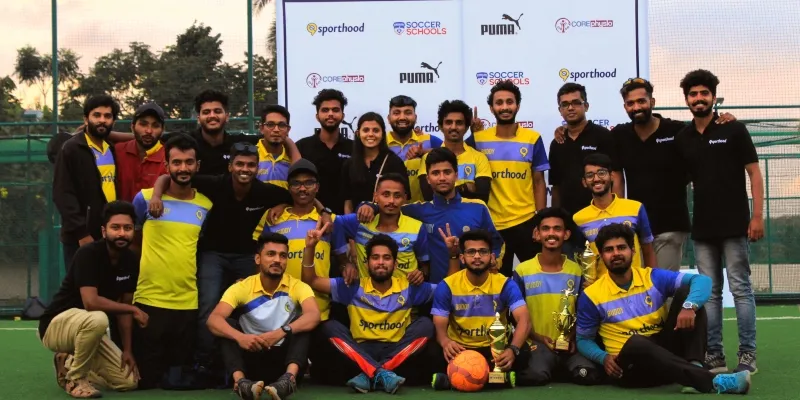Why this IIM-A grad felt the need for an OYO-like service for sports infrastructure in India
Bengaluru-based Sporthood is a network of neighbourhood sports clubs to help people across age groups connect with the sport they love and make it a part of their life. The startup, which has 20 clubs in two cities, aims to expand its network to over 150 centres in 10 cities in the next three years.
Rahul Antony Thomas, an IIM-Ahmedabad graduate, was living the good life working for a consultancy in Germany. It was here he was introduced to the concept of an “active lifestyle”.
“My landlord, a 70-year-old, would play volleyball once a week with his gang. This realisation shook me. I was 25 years old and weighed over 90 kg. So without wasting too much time, I re-engaged with football. In a matter of months, I got back to my athletic best and I realised that this positively impacted the overall quality of my life,” Rahul says.
Three years later, when his stint ended and he came back to India, Rahul realised that he couldn’t replicate that lifestyle here. It was during this time that he happened to meet Arun V Nair, who was a badminton enthusiast and had a similar experience in the US. Over a few coffee conversations, they decided to start Sporthood.
The Bengaluru-based startup is a network of neighbourhood sports clubs, helping people across all age groups to connect with the sport they love and make it a part of their life. The services portfolio extends from grassroots coaching for five-year-olds to sports-based fitness programmes designed to meet the lifestyle needs of 50-year-olds.
“Today, we have a community of approximately 20,000 kids and adults playing/training football and badminton with us across our network of close to 20 sports clubs across Bengaluru and Kochi,” Rahul says.

The Sporthood team
How does the model work?
Sporthood ties up with venue partners, similar to how OYO/Treebo tie up with unbranded hotels, and helps them monetise the sports infrastructure they have set up leveraging “our unique capabilities, under a managed franchise mechanism, helping the venue partners generate up to 2.0X returns as compared to what they would get, if they stayed as an unbranded centre with no customer service layer”.
Once a venue partner is on-boarded, Sporthood takes care of the end-to-end customer experience, including staffing and using the tech backends to manage the venue operations and deploy trained coaches (who deliver their services portfolio across sports coaching, fitness training, events, etc).
Each programme has been productised with the appropriate curriculum and lesson plans delivered to coaches via our “trainer app”, Rahul says.
The customers can access the entire service portfolio through the “Sporthood” app where their stats, progress, and entire sporting profile gets built.
“From providing PE/sports training in schools to organising city-wide events, the first 18 months was a period of experimentation and learning. By January 2015, we pivoted to the model of neighbourhood sports clubs, and launched our services at PLAY Arena, our first venue partner in Bengaluru,” Rahul says.
Getting up and running
When the duo started in 2015, the biggest challenge they faced was the availability of quality sports infrastructure across India.
“In some sense, we were ahead of the market then, but spent the initial two to three years really understanding the customer needs and crafting solutions,” Rahul says. Soon, there was a growth of sports infrastructure across metros and Tier I cities in India.
The other challenge was operational. Rahul explains that they spent a lot of time developing and fine-tuning systems and processes.
“We have developed a mobile app ecosystem that provides highly personalised user experience at the individual level, helping people track their sports performance and add it to their profile. Our vision is to become the McDonald's in sports. Over the next five years, we want to become the neighbourhood sports club where urban India plays,” Rahul says.
The team and revenue model
The team roped in Nikhilesh MR as the CTO. An MTech from IIT-Madras, he was part of the founding teams of Aryaka Networks and Voonik. They also got in Vikram Devare, an IIM-Kozhikode alumnus, who had worked for the likes of ICICI Bank. Today, Sporthood is a team of 75 people.
“We are generating a revenue run rate of Rs 6 crore per annum, growing at 10 to 15 percent month on month. The best part of the business model is that we are gross margin positive at the unit level. Right now, we are in the middle of raising a pre-Series A round to scale up our operations in Bengaluru and add more sports to our portfolio,” Rahul says.
The revenue comes from individual customers who either subscribe to one of the membership packs or pays “per game” or “per training session” or event. Adults who play regularly with Sporthood pay around Rs 2,000 per month. Parents typically spend around Rs 3,000 per month for a child’s coaching, and family memberships come in at Rs 5,000 per month.
“We add partner centres to our network on a revenue share basis. The unit economics is comparable to gyms. We are able to increase the topline of partner centres by 1.5X to 2.0X while retaining a ~20 percent gross margin at the unit level,” Rahul says.
Market and the future
According to MarketsandMarkets, the overall sports technology market would rise to $31.1 billion by 2024, growing at a CAGR of 20.63 percent. The key growth factors include “significant improvement in audience engagement, growing demand for data-driven decisions and operations, and increasing sports events, online and offline”.
There are several sports startups such as Playo, Rooter, Fantain, and The Football Mind operational these days.
“We have trained experts who help you with warm-up, cool-down, and conditioning, which reduces the risk of getting injured by 90 percent. Our skill matching algorithm ensures that you get a good game every time you play with Sporthood. What’s more, your entire playing history, with stats, achievements, etc. gets tracked as you build your amateur sporting profile,” he says.
The team is looking to add more sports like swimming, tennis, and cricket. The founders plan to expand operations to over 150 centres across the top 10 cities over the next three years.
(Edited by Teja Lele Desai)










